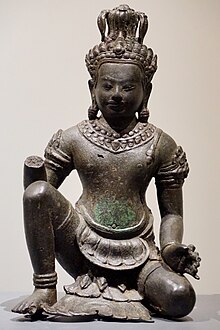
Back ويشفكرما Arabic বিশ্বকৰ্মা Assamese Vishvakarma BCL विश्वकर्मा Bihari বিশ্বকর্মা Bengali/Bangla Višvakarman Czech Vishvakarman German Vishua Karma Spanish Vishvakarma French વિશ્વકર્મા Gujarati
| Vishvakarma | |
|---|---|
 Bronze sculpture of Vishvakarma from Lopburi, Thailand, 13th century. Kept at Bangkok National Museum | |
| Affiliation | Deva |
| Abode | Svarga |
| Mantra | Om Viśvakarmane Namaḥ |
| Weapon | Scale, kamandalu, book, hammer and chisel |
| Mount | |
| Genealogy | |
| Parents | Prabhasa Vasu (father) Yogasiddha or Angirasi (mother) |
| Consort | Ghritachi |
| Children | Manu, Maya, Tvashta, Shilpi, Daivajna and Sanjna, Vishvarupa, Barhismati, Chitrangada, Nala |
| Part of a series on |
| Hinduism |
|---|
 |
Vishvakarma or Vishvakarman (Sanskrit: विश्वकर्मा, lit. 'all maker', IAST: Viśvakarmā) is a craftsman deity and the divine architect of the devas in contemporary Hinduism. In the early texts, the craftsman deity was known as Tvastar and the word "Vishvakarma" was originally used as an epithet for any powerful deity. However, in many later traditions, Vishvakarma became the name of the craftsman god.[2]
Vishvakarma crafted all of the chariots of the devas and weapons including the Vajra of the god Indra.[3] Vishvakarma was related to the sun god Surya through his daughter Samjna/Randal. According to the legend, when Samjna left her house due to Surya's energy, Vishvakarma reduced the energy and created various other weapons using it. Vishvakarma also built various cities like Lanka,[4] Dvaraka, and Indraprastha.[2] According to the epic Ramayana, the vanara (forest-man or monkey) Nala was the son of Vishvakarma, created to aid the avatar Rama.[5]
- ^ "Vishvakarma, Viśhwakarmā, Viśhwakarma, Vishwakarman, Viśhwakarman, Vishwa-karman: 26 definitions". 19 December 2011.
- ^ a b Coulter, Charles Russell; Turner, Patricia (4 July 2013). Encyclopedia of Ancient Deities. Routledge. ISBN 978-1-135-96397-2.
- ^ Coomaraswamy (1979), p. 79.
- ^ "Sarga 2 | Sundara Kanda - Ramayana". siva.sh. Retrieved 4 December 2023.
- ^ "Sarga 17 | Bala Kanda - Ramayana". siva.sh. Retrieved 5 December 2023.